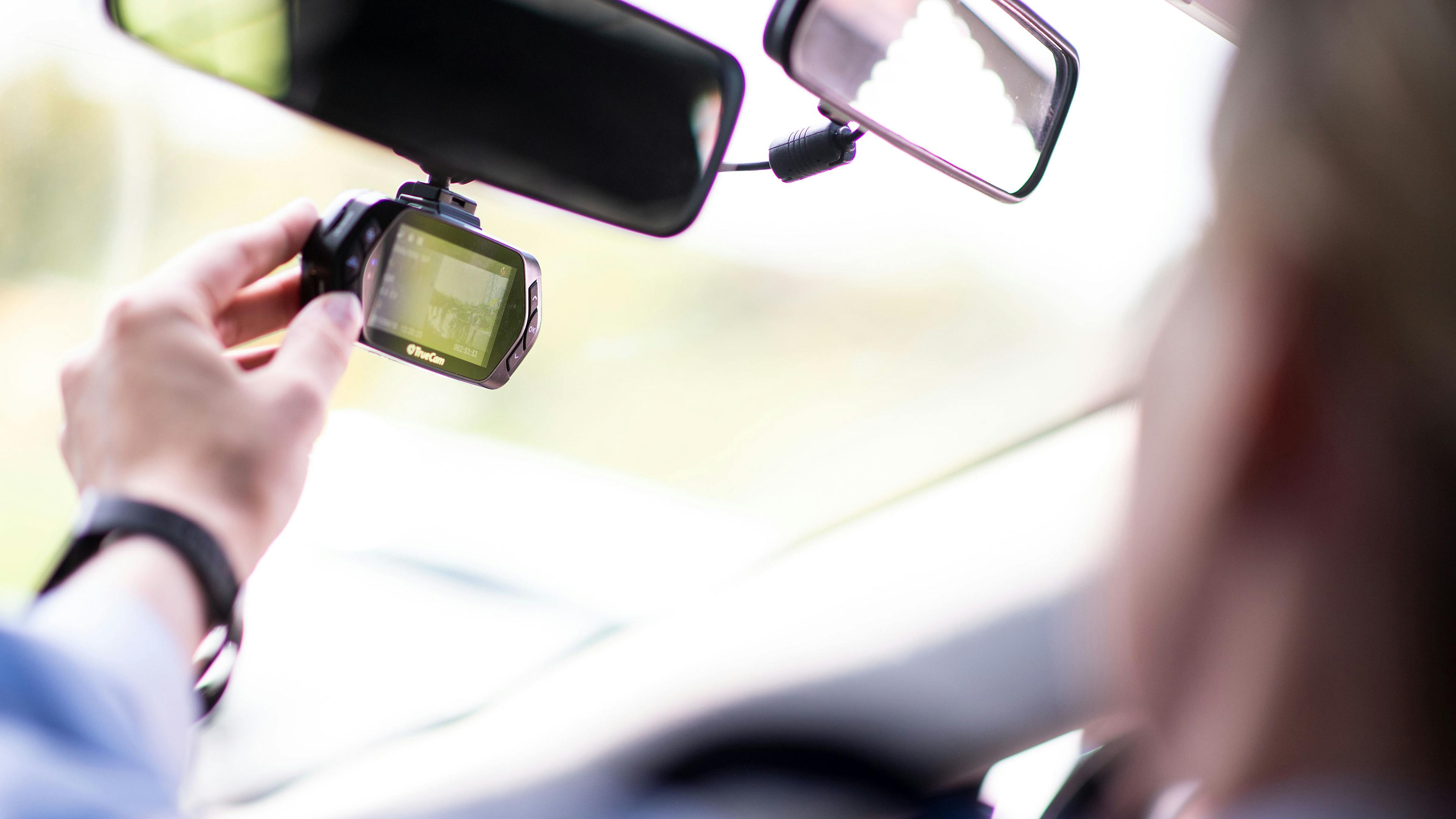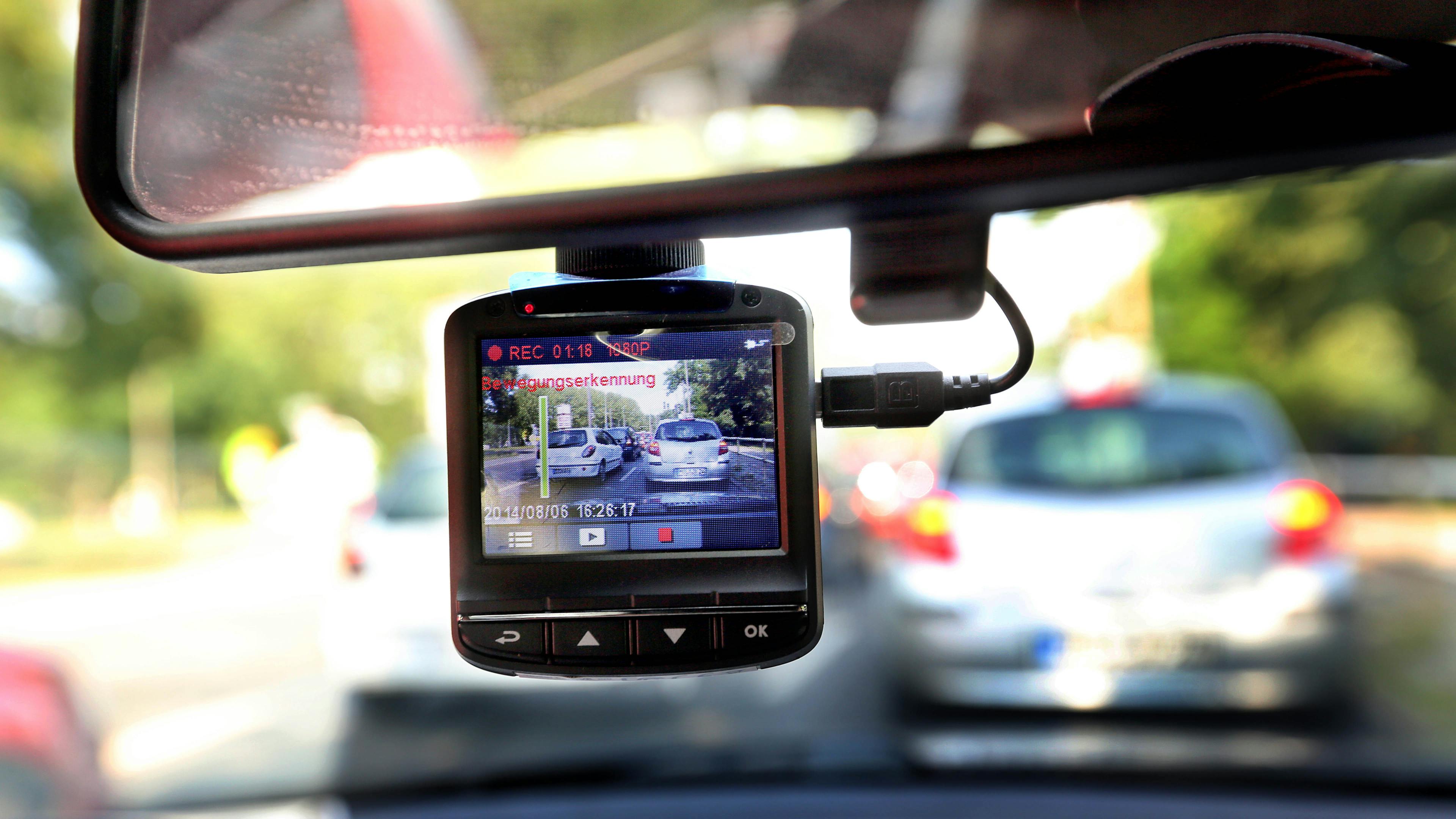Are dash cams allowed in Germany?
They are widely used abroad, and you can also encounter them more and more often here: dash cams. According to the insurance company DA Direkt, one in ten cars now has such a mini camera on board.
Dash cams are mounted on the dashboard or on the inside of the windshield and can film what is happening on the road from the driver's perspective. Users hope that the recordings will be able to prove their innocence in the event of an accident or to report the misconduct of others in road traffic. But there are legal pitfalls lurking when using dash cams.
The most important things at a glance
- Dash cams in the car can film what is happening around the vehicle while driving or parking.
- The small car cameras are not banned – but the legal situation is complicated.
- Recordings without cause and their publication violate the GDPR and personal rights.
- Fines can be imposed in the event of violations – but in individual cases, the recordings can also be used as evidence in court.
Is the use of a dashcam allowed in Germany?
The use of a dashcam is not generally prohibited in Germany - but there are legal restrictions and requirements for its use.
In principle, according to the current General Data Protection Regulation (GDPR) in Germany, the use of video cameras is only permitted if it is "necessary for the safeguarding of legitimate interests for specifically defined purposes and there are no indications that the interests of the data subjects worthy of protection outweigh them". This applies to all types of surveillance cameras – both in shops and on your own property as well as dash cams in the car.
Example: A shop operator is allowed to video monitor his business to protect against theft (legitimate interest). Cameras are necessary for this "specifically defined purpose", but may not be installed in changing rooms or toilets, where people's privacy needs to be better protected (interest worthy of protection of those affected). The recordings may not be permanently stored without a special reason, such as an incident. In addition, customers must be informed about the camera surveillance by means of signs. Covert video surveillance would be inadmissible.
What you need to consider when it comes to data protection with dash cams
Filming the drive on a beautiful serpentine road on vacation is not critical, as long as you use the recordings exclusively for private purposes. However, this does not include publication on social networks: If you want to publish the recordings on a public account or otherwise, no strangers must be recognizable on them. Otherwise, you violate:
- The right to informational self-determination: In Germany, every person has the right to their own image and may not be photographed or filmed against their will.
- The General Data Protection Regulation (GDPR): Recordings may not be published without being asked and without the consent of the data subjects.
According to the GDPR, license plates are also considered personal data. The publication of pictures with car license plates is not allowed if it aims to make the owner identifiable and to denounce him, for example, for illegal parking. If a vehicle with its license plate number is only coincidentally in the picture, publication is usually permissible.
While driving in flowing traffic, it is impossible to inform the filmed people about the recording, let alone obtain their consent for it. From a data protection point of view, it is therefore important that dash cams are only used briefly and on occasion. This means that the camera is only switched on and the film recordings are only stored if an accident occurs, for example. Some dash cams have so-called G-sensors, which are only active during hard braking or acceleration and automatically save the recordings.
Simply filming every car trip permanently and without a specific reason is therefore critical. In the event of violations, the data protection supervisory authorities can impose fines, which can amount to 1,000 euros and more in the case of intentional or repeated violations.
By the way, you are also threatened with fines if you, as a "deputy sheriff", want to report the misconduct of other road users to the police with dashcam recordings: Only the police are allowed to use video recordings for criminal prosecution - and even the investigating authorities are limited here.
Bavaria takes action against illegal dashcam use
The Bavarian State Office for Data Protection Supervision has announced that it will take action against inadmissible publications of dashcam recordings. If they become aware of the passing on of the video films to the police, public prosecutor's office or motor insurance companies or if they are published on the Internet, it will be checked whether a fine is due.
Can you use a dash cam to monitor your parked car?
Some dash cams have a so-called park or guard mode, which records movements around the car. Such cameras are already installed in some vehicles, such as Tesla models.
If a car parked in public spaces is damaged, this can be very useful. However, the same data protection rules apply here as during the journey: Other road users may not simply be filmed permanently and without cause.
If the parking or guard mode cannot be set in such a way that, for example, motion sensors only save recordings in the event of a vibration – i.e. on an occasion-related basis – the dashcam must not be used when parking in public spaces.
Are dash cam recordings admissible as evidence in court?
For a long time, dashcam footage of an accident was not allowed in court proceedings. This has changed since a ruling of the Federal Court of Justice (BGH) of May 15, 2018 (Az. VI ZR 233/17): Since then, courts have been allowed to decide on a case-by-case basis whether permanent and unjustified recordings of a dashcam are admitted as evidence or not.
The judges' reasoning: Road users expose themselves to the perception and observation of other road users on public roads anyway.
Accordingly, the encroachment on the personal rights of others does not lead to a fundamental prohibition on the use of evidence in the recordings. However, a weighing of interests and interests must always be made: Do the interests of the injured party in the exploitation of the recordings outweigh the rights of third parties? This must be weighed up on a case-by-case basis.
So are permanent recordings while driving with it allowed after all? No. In its ruling, the Federal Court of Justice explicitly pointed out that recordings without cause are not necessary to protect the interests of preserving evidence and violate data protection.

How is dash cam use regulated abroad?
There is no uniform regulation on the use of dash cams at EU level, and most countries have so far lacked concrete legal requirements. In individual cases, you should find out in advance about the regulations in the respective country before using your dashcam, for example on holiday trips abroad.
In the following European countries, dash cams are allowed subject to certain rules:
| Land | Dash cam usage rules |
|---|---|
| Bosnia and Herzegovina | Unproblematic; Those involved in the accident must be informed immediately if the recordings are used as evidence |
| Denmark | Unproblematic; Those involved in the accident must be informed immediately if the recordings are used as evidence |
| Finland | Unproblematic; Those involved in the accident must be informed immediately if the recordings are used as evidence |
| France | Unproblematic; Those involved in the accident must be informed immediately if the recordings are used as evidence |
| Great Britain | For private use only |
| Italy | For private use only |
| Malta | For private use only |
| Netherlands | For private use only |
| Norway | For private use only |
| Austria | For private use only |
| Poland | Camera must be easily removable, recordings must be overwritten regularly |
| Romania | Unproblematic; Camera must not obstruct the driver's view, faces and license plates must be made unrecognizable before publication |
| Sweden | Camera must be easily removable, recordings must be overwritten regularly |
| Serbia | Low resolution camera allowed; Delete unnecessary data after five days and protect it from unauthorized access |
| Spain | Low resolution camera allowed; Delete unnecessary data after five days and protect it from unauthorized access |
| Czechia | Low resolution camera allowed; Delete unnecessary data after five days and protect it from unauthorized access |
| Hungary | Low resolution camera allowed; Delete unnecessary data after five days and protect it from unauthorized access |
You should not use a dash cam in the following countries:
- Belgium
- Luxembourg
- Portugal
- Switzerland
Dash cams in Austria: What is allowed?
Similar to Germany, cameras installed on buildings and vehicles are also subject to strict data protection requirements in Austria. While occasion-related recordings of the course of an accident are permitted in exceptional cases, systematic and unjustified monitoring is prohibited.
However, even if a dash cam recording is permissible according to these criteria, this does not entitle the recording to be passed on or published. Anyone who publishes image or video material without permission on which persons or license plates can be recognized is liable to prosecution in Austria. Violations can result in severe fines.
Buying a dashcam: You should pay attention to these features
If you don't want to get into trouble with the GDPR and increase the likelihood that dash cam footage is admissible as evidence after an accident, the camera shouldn't systematically film road traffic and automatically delete or overwrite the footage after a certain period of time.
Therefore, you should pay attention to the following features when buying a dash cam:
- Loop function: The camera only saves short video sequences in an endless loop and overwrites the recordings when the memory is full.
- Accelerometer or G-sensor: The camera detects decelerations and accelerations, such as in the event of a collision. These sequences are automatically saved (emergency admission) and protected from later overwriting.
- Motion detection: With parking monitoring, the camera only switches on when it detects movement around the vehicle.
It is also useful if the dash cam has a GPS sensor and provides data on the exact recording location and speed as well as the exact recording date and time. A smartphone connection is also practical for data backup.

Installation and costs: How can you have your dash cam installed?
You can easily install a dashcam yourself. Most models are either glued on or attached to the desired position with a suction cup. The latter is particularly practical if you change your vehicle more often.
The mini cameras are usually operated via the cigarette lighter or battery. For models with battery operation, you should therefore pay attention to the battery life before buying.
Depending on the features, such as image resolution, battery life and functions, dash cams cost between 30 and 1,000 euros in stores. However, the cheaper the model, the less you should expect in terms of privacy features. Models around 150 euros usually provide good image quality thanks to the loop function as well as data protection-compliant storage of the recordings.
